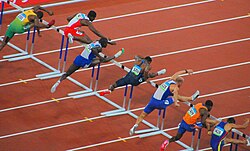| Sprint hurdles at the Olympic Games | |
|---|---|
 The 2008 Olympic men's 110 m hurdles semi-final | |
| Overview | |
| Sport | Athletics |
| Gender | Men and women |
| Years held | Men 110 m: 1896 – 2020 Men 200 m: 1900 – 1904 Women 80 m: 1932 – 1968 Women 100 m: 1972 – 2020 |
| Olympic record | |
| Men | |
| Women | |
| Reigning champion | |
| Men | |
| Women | |
The sprint hurdles at the Summer Olympics have been contested over a variety of distances at the multi-sport event. The men's 110 metres hurdles has been present on the Olympic athletics programme since the first edition in 1896. A men's 200 metres hurdles was also briefly held, from 1900 to 1904. The first women's sprint hurdling event was added to the programme at the 1932 Olympics in the form of the 80 metres hurdles. At the 1972 Games the women's distance was extended to the 100 metres hurdles, which is the current international standard.
Contents
- Medal summary
- Men's 110 metres hurdles
- Women's 80 metres hurdles
- Women's 100 metres hurdles
- 200 metres hurdles
- Finishing Times
- Top ten fastest Olympic times
- Intercalated Games
- References
- External links
The Olympic records are 12.91 seconds for the men's 110 m hurdles, set by Liu Xiang in 2004, and 12.26 seconds for the women's 100 m hurdles, set by Jasmine Camacho-Quinn in 2020. The fastest time recorded at the Olympics for the men's 200 m hurdles was 24.6 seconds by 1904 winner Harry Hillman. Maureen Caird won the last women's Olympic 80 m hurdles race in 1968 with a record of 10.39 seconds. The men's 110 m hurdles world record has been broken at the Olympics on six occasions: 1908, 1928, 1932, 1936, 1972, 2004, and 2012. The women's 100 m hurdles world record has been broken only once, by Annelie Ehrhardt at the inaugural 1972 Olympic final. [1] In contrast the 80 m hurdles world record was set at the Olympics in 1932 (four times), 1936, and 1952 (twice). [2]
Only three athletes have won two Olympic sprint hurdles gold medals: on the men's side, Lee Calhoun, and Roger Kingdom, and on the women's side Shirley Strickland. Strickland is also the only athlete to win three such Olympic medals, having won a bronze medal before her victories. Alvin Kraenzlein is the only athlete to have won two hurdles medals at the same Olympics, having taken the 110 m and 200 m titles. Historically, hurdlers also competed in other individual sprinting events (Harrison Dillard and Fanny Blankers-Koen were also 100 metres Olympic champions), but this became rare after the 1950s.
The United States has been the most successful nation in the men's event with 19 gold medals and 56 medals in total. Though less dominant in the women's events, the U.S. also has the most women's gold medals, with five.